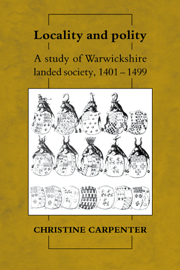Book contents
- Frontmatter
- Contents
- List of figures and tables
- Preface
- List of abbreviations
- Note on text
- 1 Introduction
- PART I STRUCTURAL
- PART II CHRONOLOGICAL
- 9 Social and political networks 1401–50
- 10 Warwickshire under Richard Beauchamp: 1401–39
- 11 The interregnum: 1439–49
- 12 The period of crisis I: Warwickshire under the Kingmaker: 1449–61
- 13 The period of crisis II: Warwickshire under the Kingmaker and the duke of Clarence: 1461–78
- 14 The period of crisis III: Warwickshire under the crown: 1478–85
- 15 The period of crisis IV: Warwickshire under the crown: 1485–99
- 16 Politics and society c. 1449–1500
- 17 Conclusions
- Appendices
- Bibliography
- Index
15 - The period of crisis IV: Warwickshire under the crown: 1485–99
Published online by Cambridge University Press: 27 October 2009
- Frontmatter
- Contents
- List of figures and tables
- Preface
- List of abbreviations
- Note on text
- 1 Introduction
- PART I STRUCTURAL
- PART II CHRONOLOGICAL
- 9 Social and political networks 1401–50
- 10 Warwickshire under Richard Beauchamp: 1401–39
- 11 The interregnum: 1439–49
- 12 The period of crisis I: Warwickshire under the Kingmaker: 1449–61
- 13 The period of crisis II: Warwickshire under the Kingmaker and the duke of Clarence: 1461–78
- 14 The period of crisis III: Warwickshire under the crown: 1478–85
- 15 The period of crisis IV: Warwickshire under the crown: 1485–99
- 16 Politics and society c. 1449–1500
- 17 Conclusions
- Appendices
- Bibliography
- Index
Summary
Thanks to Edward IV and Richard III, Henry Tudor was in a remarkably strong position for one who had taken the throne by force with such a flimsy title. Unlike Edward IV he had few rivals with claims much more credible than his own, and, of these, Edward of Warwick, Clarence's son, the only real Yorkist contender, was in his custody. He had also managed to kill his predecessor on the battlefield, which meant that he did not labour under the terrible burden of Edward's first reign in having an anointed and crowned opponent to deal with. Like Edward he did have a kingmaker, in Henry's case Lord Stanley, soon after promoted earl of Derby, but this one was married to the king's mother, his most loyal subject. Furthermore, as we shall see, it had become much harder for magnates like the Stanleys to carve out petty kingdoms in the localities, the result of habits of obedience to the monarchy instilled into the gentry under Edward IV and of the decline in the gentry's instinctive reliance on the nobility that had been evident since the 1450s. Henry had become king because Richard III had turned against himself the vast royal affinity which had taken over the midlands and the south in the later years of Edward's rule, or at least had made it indifferent to his fate. There was consequently a predisposition to be loyal to the man who had removed the usurper with the help of some of Edward's closest servants and married Edward's daughter.
But he also had problems. The holocaust of leading landowners between 1483 and 1485, while minimising the threat of local particularism, deprived Henry of men who could take charge of a whole region on the king's behalf, as Hastings had done for Edward.
- Type
- Chapter
- Information
- Locality and PolityA Study of Warwickshire Landed Society, 1401–1499, pp. 560 - 596Publisher: Cambridge University PressPrint publication year: 1992



